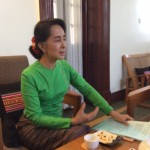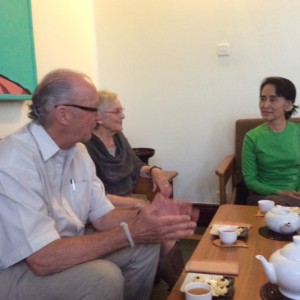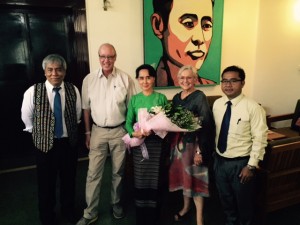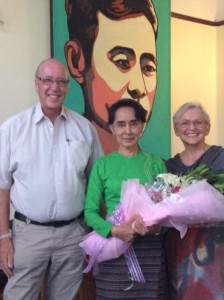Tea with the Lady
A visit with Aung San Suu Kyi
On the occasion of my 60th birthday Leona asked if I could visit with just one person in the world who would that be. My unequivocal answer was Aung San Suu Kyi. On April 29, 2015 we had tea in her home in Yangon and my bucket list became a little shorter.

Aung San Suu Kyi is a great comversationalist but has a clear idea of her objectives. Many world leaders pass through her living room!
My expectations were met and exceeded. Suu Kyi is gracious, animated, thoughtful and 69 going on 45. Her body is trim, skin flawless and hair jet black with her trademark flowers.
The meeting started promptly on time and she is generous with the inevitable photographs. We discovered that she actually puts them to her own use – the staff at our hotel commented the next morning that they had seen our photos on her Facebook page!
The meeting was arranged by friends engaged in the effort to establish peace after 60 years of conflict. Zaceu Lian is founder of the Canadian-based NGO Council for Democracy in Burma our primary contact in Burma and the person who arranged the meeting. We were joined by Dr. Lian Sackhong founder of The Burma Center for Ethnic Studies, chief negotiator for the Chin ethnic group and the person who personally drafted the recently accepted (not yet signed) ceasefire agreement between the Military Government and the 16 major armed groups. He asked to take advantage of our appointment to raise an issue with Suu Kyi and we readily agreed to share the time. His planned short intervention turned into an animated, energetic and passionate discussion between two extremely capable and intelligent political actors. They apologized for the switch to the Burmese language and we watched as two professionals sparred and found an acceptable compromise. Her next appointment was with the British Ambassador but she presumably decided to deal with the political issue at hand so he cooled his heels in his black SUV for another 25 minutes.
We had assisted with the sponsorship and organization of a Peacebuilding seminar a year earlier. She missed the event due to health and invited us to see her on a future visit. Suu Kyi is a gracious host, listens well, expresses genuine interest in her guests and maintains continuous eye contact. She leans forward, gestures with both hands and is fully in control of the room and event. Her performance provided some insight into the inner strength that has allowed her to survive 25 years of confrontation – one woman against one of the largest military establishments on earth.
But Aung San Suu Kyi is not just any woman. She is the daughter of Aung San, a WWII Burmese military leader who first sided with the Japanese invaders to oust the colonial powers but switched sides in time to become a military hero. He went on to negotiate independence from the British with a formula that was acceptable to the complex mix of nationalities and is considered the hero of Burmese independence. He was unfortunately assassinated before the agreed political structures were in place and his followers reneged, attempted to establish the dominance of one group. The result was 60 years of conflict, a million casualties and additional millions of refugees. Suu Kyi left Burma for an education at Oxford and a family life in the West. Her return in 1988 to care for a sick mother coincided with the student riots that became the Burmese version of Tiannemen Square. The coincidence of personality, events and history are so improbable that if proposed as a plot for a novel or movie they would stretch credulity – except that the plot is the reality. This is the person who hosted us for tea.

Aung San Duu Kyi challenges the military Government from a corner of her living room. Her only weapons are a cup of tea plus her forceful personality.
Suu Kyi had been briefed on our background and asked us to describe our history in the region and especially our work with refugees. We worked with the post-war reconstruction of neighboring Bangladesh 1972-74, adopted our daughters from there and have had continueing engagement. We worked at the Thai-Cambodian border during that conflict and have been involved with development efforts that include all of the regional countries.
When we described our role in the establishment of a University (LCC International University in Lithuania) to serve students challenged by the post-Soviet environment she very aggressively asked how we could assure that these students would return to serve their own countries. This concern seemed to reflect her own sense of obligation (or accident of history) to return and play a role in Burma. I suggested that many refugees like my mother represented minorities or situations where they were unwelcome because of their very identity rather than their political views and could not be expected to be obligated to the oppressor. On the other hand my engagement with the Soviet Union a generation later is one answer to her concern.
I asked her if I could seek her views on several political issues and she was very willing. Suu Kyi is from the majority Burman group so I wanted to hear her understanding of federalism in the Burmese context. There have been questions about her commitment on this question. She was very forceful in explaining that it was unhelpful to identify a country or model in advance – but unless they found a form of federalism that was meaningful and acceptable to the ethnic minorities all other efforts were futile.
The question of religious pluralism has been problematic in the current Burma. Suu Kyi practices Therevada Buddhism and noted that both of us had retained fraying string on our wrists – originating in earlier Buddhist ceremonies – and both of us were superstitious enough to leave them in place until they disappeared of their own accord. She lamented that religion should be a source of unity rather than conflict but did not address the political question directly. I then turned to the Rohingya problem in the western parts of the country. The ancestors of this group would have migrated from Bengal or other parts of British India at a time when borders did not exist. The Burmese do not consider this group as part of the ethnic legacy of Burma (they list 135 accepted ethnic groups – one would think they could make it 136). The fact that they are Muslim is likely the biggest factor. I had personal experiences with this group during my time in Bangladesh. Our agency was asked to assist with an influx of refugees coming out of Burma in 1973. In other words the repression of this group is not a new phenomenon! Suu Kyi acknowledges the problem but has been accused of public silence on this issue. A highly moral stance would not play well with her Burman and Buddhist support base. She is after all a politician trying to win an election!
Another critical issue for my ethnic colleagues is her perspective on the relative priorities of a national cease-fire agreement (to allow these groups to get on with life after 60 years) and the need for constitutional changes which would end the military monopoly of power and co-incidentally clear the way for Suu Kyi to become President. One might think that the two issues are parts of a whole but one does not in fact depend equally on the other. My colleagues were concerned that her focus on the constitution might create space for the military to go slow on the ceasefire. The concern of Suu Kyi is that the ceasefire and its consequences might allow space for the military to lose focus on a meaningful election that they might lose. These concerns were at the heart of the debate that we witnessed.
We discussed the role that a country such as Canada should play (Canada has made her an honorary Canadian) and we all agreed that Canada to this point has been a bystander and may be hostage to the conservative Burmese diaspora in Canada that tries to prevent any efforts to negotiate with the military Government. It seems Canada is developing a reputation for being the most rigid in terms of dealing with complex situations like the current Ukraine, Iran, Israel- Palestine, China and Burma. Diplomacy is not about celebrating with your best friends!
I asked if she could articulate her vision for the country. She responded that the country first needs to get past a successful election in November. We discussed this and other issues with Suu Kyi and also with the many passionate activists who have returned and are taking advantage of the real but far from perfect political opening. The history of transitions from military Governments to successful democracies is anything but a straight line. I came away with the impression that Aung San Suu Kyi will remain a formidable political actor with the vision and ambition to create a Burma that is at peace and reflects the wishes of all of its’ people.
Suu Kyi was awarded the Nobel Peace Prize in 1991 and many subsequent awards. She faces the risk of being criticized for actions or views that will result from the realities of political power or compromise. It is easier to be rewarded for what has happened in the past but she does not have that luxury.
Whatever the future holds we left the meeting aware that we had been in the presence of greatness. She is playing a difficult hand and we wish her and the people of Burma well. Note: I have used the term Burma rather than the official name Myanmar which has specific negative political connotations for the minority ethnic groups. Suu Kyi also chose to use the term Burma.
My visit to Burma, Laos and Ho Chi Minh in December 2013 is documented in the essay “Christmas, Peace and Other Subjects” on my website. The format is political comment embedded in a travelogue.





